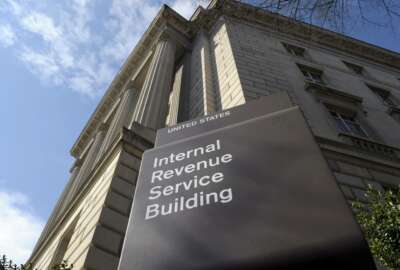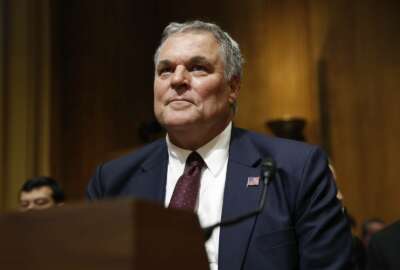
Biden to nominate Danny Werfel as IRS commissioner, overseeing $80B to rebuild agency
The IRS, setting course on a decade-long push to rebuild its workforce and modernize its legacy IT, may soon be led by a figure that previously steered the agency...
Best listening experience is on Chrome, Firefox or Safari. Subscribe to Federal Drive’s daily audio interviews on Apple Podcasts or PodcastOne.
The IRS, setting course on a decade-long push to rebuild its workforce and modernize its legacy IT, may soon be led by a figure who previously steered the agency through difficult times.
The White House announced Thursday that President Joe Biden intends to nominate Danny Werfel to lead the IRS for a five-year term.
Werfel holds more than 15 years of federal experience across the George W. Bush and Obama administrations, and previously served as an acting IRS commissioner.
If confirmed, Werfel would help the IRS oversee $80 billion in spending over the next decade to build up its workforce and overhaul its aging technology.
These investments are meant to improve the IRS’s level of service to the public starting next filing season, and shrink the growing “tax gap” between what taxpayers owe and what the IRS collects every year
House and Senate Republicans, however, have promised to repeal this IRS funding if they retake control of both chambers.
“From the bottom of my heart, the IRS is an extraordinary agency. It’s resilient, it does an amazing job running a very complex process, which the nation’s tax system is. And it’s been an agency that has been on a lower and lower resource footprint over time — versus what it needs to fully modernize and meet its mission,” Werfel said in an April 2021 interview.
Last year, when the Biden administration first proposed an $80 billion investment in the IRS as part of the Build Back Better Act, Werfel said the funding would help lay the foundation for a “high-functioning IRS.”
“I hope that we’re going to make some critical investments in the IRS going forward, because I do think there’s huge opportunities to modernize in a way that will improve taxpayer experience, make tax filing and meeting your tax obligations potentially more user-friendly, more digital,” Werfel said, adding that these investments would also help reduce identity theft, fraud and error rates at the agency.
Former President Barack Obama named Werfel as acting IRS commissioner in 2013, after the agency came under fire for excessive conference spending and scrutinizing the tax-exempt status of some political organizations.
“Werfel provided immediate stability to the IRS, effectively responding to numerous congressional investigations, successfully launching the Affordable Care Act technology that IRS was responsible for, and navigated the IRS through a multi-week government shutdown,” the White House said Thursday in a statement.
Werfel also served as the Office of Management and Budget’s controller, a position that’s been vacant for more than five years.
As OMB controller, Werfel led an interagency effort to oversee $787 billion of stimulus spending in the aftermath of the 2008 financial crisis. He also helped lead the federal government through the 2013 sequestration.
Werfel spent the last nine years at Boston Consulting Group, where he helped launch its public-sector practice.
Treasury Secretary Janet Yellen said in a statement Thursday that Werfel’s experience across multiple administrations makes him “uniquely qualified to lead the agency at this critical juncture.”
“After decades of underfunding, the IRS now has the resources it needs to improve services for taxpayers and modernize outdated technology and infrastructure. Danny’s deep commitment to fairness and making sure government works for all will also be invaluable as we improve the taxpayer experience and eliminate a two-tiered tax system,” Yellen said.
Yellen in August directed the IRS in August to develop a plan in six months outlining how it will overhaul its IT, taxpayer service and hiring processes in light of the Inflation Reduction Act’s 10-year investment in the agency
House Ways and Means Committee Chairman Richard Neal (D-Mass.) said Werfel would be able to “hit the ground running,” given his background with the IRS and federal financial management.
Meanwhile, the current IRS commissioner, Chuck Rettig, is thanking the IRS workforce, in his final week in office, for going to extraordinary lengths to deliver COVID-19 relief programs to the public over the past two years.
The IRS delivered more than $1.5 trillion to people across the nation through tax refunds and by implementing various relief measures to help Americans cope with the financial effects of COVID-19. More than half of that spending went into 500 million Economic Impact Payments.
“I have been constantly amazed at the accomplishments of IRS employees during what has been a challenging and historic time for our nation,” Rettig said in an email to employees. “Time and again I have seen them deliver for taxpayers under tight timeframes and difficult circumstances — responding in a manner that demonstrates the importance of every American to the IRS and the IRS to every American.”
Rettig’s final day in office is Nov. 12. Doug O’Donnell, the IRS deputy commissioner for services and enforcement, will serve as acting commissioner.
Rettig, in his email to IRS employees, said the agency is “on the brink of an exciting new era” that will lead to improved taxpayer experience and will ensure fairness in tax compliance.
He called the $80 billion investment in the IRS a “transformational moment” for the agency that will allow it to strengthen tax enforcement as well as improve taxpayer services.
He also pushed back on concerns from congressional Republicans that the funding would only bolster its audit operations.
“This legislation is not about auditing or pursuing hardworking people who pay their taxes. It’s an investment in the future of our country to make the IRS serve taxpayers, through improved technology and fair enforcement of the tax code. Ultimately, these investments will make it easier for people to interact with the IRS and improve our audit tools, making it even less likely for honest taxpayers to hear from the IRS or receive an audit letter,” Rettig said.
Each year, the IRS collects more than $4 trillion in taxes and about 96% of the funding that supports the federal government’s operations.
Rettig said the pandemic underscored the fact that the IRS “is more than a tax administration agency,” and said IRS employees serve and interact with more Americans than any other public or private organization.
“With the recent funding commitment to the IRS for the next decade, people should know that this important work to transform and improve the agency will be guided by employees dedicated to public service and delivering for our great country,” he said.
Rettig said the IRS continues to make progress on reducing paper correspondence inventory and processing paper tax returns from 2021 as well as work on our response to an unprecedented level of phone demand, situations that have been compounded by the pandemic and related issues.
The IRS has deployed surge teams and mandatory overtime to address the backlog. While this work will continue through the end of the year to get the IRS to a healthy state with its backlog, Rettig earlier this fall gave surge team employees a one-time $1,000 bonus to thank them for their hard work.
Rettig repeatedly asked Congress for higher budgets and multi-year funding to recover from more than a decade of budget and staffing cuts. Congress cut the IRS budget cut by more than 15% over the past decade.
Rettig said the $80 billion in the Inflation Reduction Act is critical to ensuring the IRS can deliver meaningful services to taxpayers, conduct critical enforcement initiatives and support long-term modernization efforts.
“Make no mistake, the IRS has a great deal of hard work ahead to deliver on the high expectations this historic funding will provide. But I have great confidence IRS employees are up to the task, and will deliver for the nation as they have countless times before in the history of our agency,” he said.
Copyright © 2025 Federal News Network. All rights reserved. This website is not intended for users located within the European Economic Area.
Jory Heckman is a reporter at Federal News Network covering U.S. Postal Service, IRS, big data and technology issues.
Follow @jheckmanWFED
Related Stories





